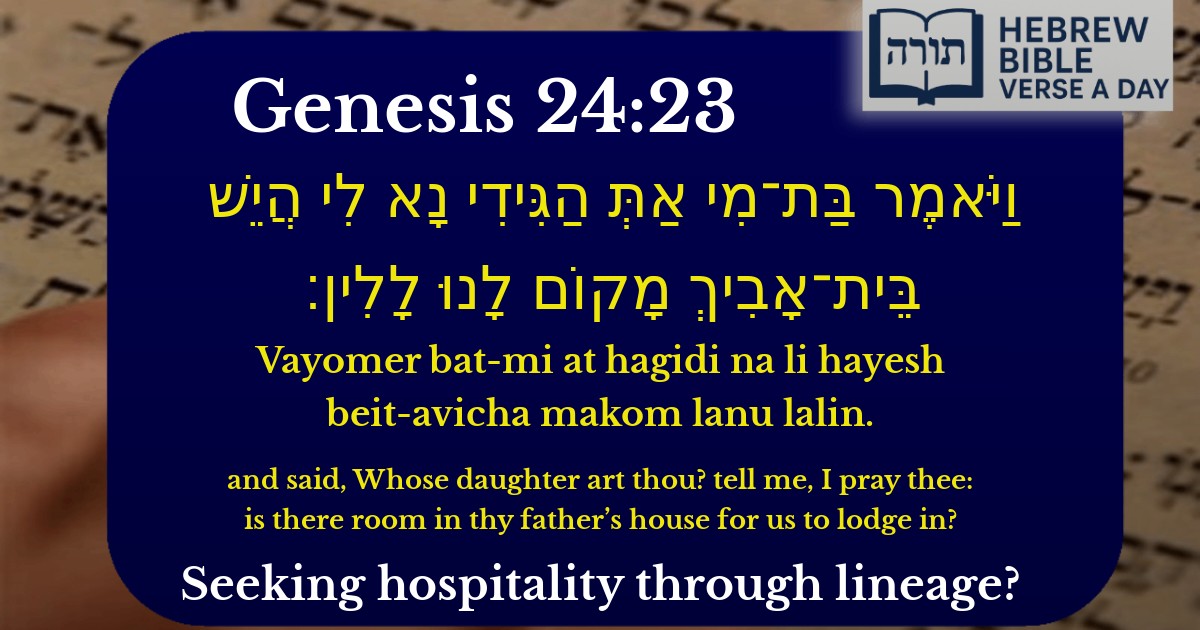Frequently Asked Questions
Q: What is the context of Genesis 24:23?
A: Genesis 24:23 is part of the story where Eliezer, Abraham's servant, meets Rebecca at the well. He had just witnessed her kindness in drawing water for him and his camels, and he asks whose daughter she is and if there is room in her father's house for them to stay overnight. This leads to the discovery that she is from Abraham's family, fulfilling his mission to find a wife for Isaac.
Q: Why did Eliezer ask Rebecca whose daughter she was?
A: Eliezer was sent by Abraham to find a wife for Isaac from Abraham's family (Genesis 24:4). By asking Rebecca whose daughter she was, he was verifying if she was from the right lineage. According to Rashi, Eliezer was checking if she was from a cursed family (like the Canaanites) or from Abraham's blessed family.
Q: What is the significance of Eliezer asking for lodging in Rebecca's father’s house?
A: Eliezer wanted to see if Rebecca's family practiced hospitality (hachnasat orchim), a key trait of Abraham's household. The Midrash (Bereishit Rabbah 60:6) highlights that true kindness includes inviting guests into one's home. By asking for lodging, Eliezer was testing whether her family shared the same values as Abraham.
Q: How does this verse teach us about proper manners when seeking hospitality?
A: Eliezer’s polite request ('tell me, I pray thee') shows derech eretz (proper conduct). The Talmud (Berachot 8a) teaches that one should always ask respectfully when seeking help. Eliezer didn’t demand lodging but humbly inquired, setting an example for how we should approach others.
Q: What lesson can we learn from Rebecca’s response to Eliezer’s question?
A: Rebecca immediately answers that there is room in her father’s house (Genesis 24:25), showing her family’s generosity. The Rambam (Hilchot De’ot 5:3) teaches that welcoming guests is a mitzvah. Her readiness to help reflects the middah (character trait) of chesed (kindness), which is central to Jewish values.


Context of the Verse
This verse (Genesis 24:23) is part of the narrative where Eliezer, the servant of Avraham, encounters Rivkah at the well. After witnessing her extraordinary kindness in drawing water for him and his camels, Eliezer inquires about her family and whether there is room in her father’s house for lodging. This moment is pivotal in the story of finding a wife for Yitzchak.
Eliezer’s Inquiry: "Whose Daughter Art Thou?"
Rashi explains that Eliezer’s question, "בַּת־מִי אַתְּ" ("Whose daughter art thou?"), was not merely about her lineage but a deeper inquiry into her character and family background. Since Rivkah had demonstrated exceptional chesed (kindness), Eliezer sought to confirm whether she was indeed from Avraham’s family, as such traits were characteristic of Avraham’s household (Rashi on Genesis 24:23). The Midrash (Bereishit Rabbah 60:5) adds that Eliezer recognized her righteousness through her actions, aligning with the principle that "ma’aseh avot siman la’banim" (the deeds of the forefathers are a sign for the children).
The Request for Lodging
Eliezer’s question, "הֲיֵשׁ בֵּית־אָבִיךְ מָקוֹם לָנוּ לָלִין" ("Is there room in thy father’s house for us to lodge in?"), reflects his cautious approach. The Ramban (Nachmanides) notes that Eliezer did not assume hospitality but respectfully asked, demonstrating proper derech eretz (courtesy). Additionally, the Talmud (Sotah 46b) teaches that a righteous person’s words are fulfilled—Eliezer’s request for lodging was answered affirmatively, as Rivkah’s family welcomed him.
Symbolism of Hospitality
The emphasis on lodging underscores the importance of hachnasat orchim (welcoming guests) in Avraham’s legacy. The Midrash (Bereishit Rabbah 60:6) highlights that Rivkah’s family, though not yet fully aligned with Avraham’s values, still exhibited hospitality, a sign of their potential for righteousness. This mirrors Avraham’s own trait of welcoming travelers, as seen earlier in Genesis 18.
Key Lessons from the Verse